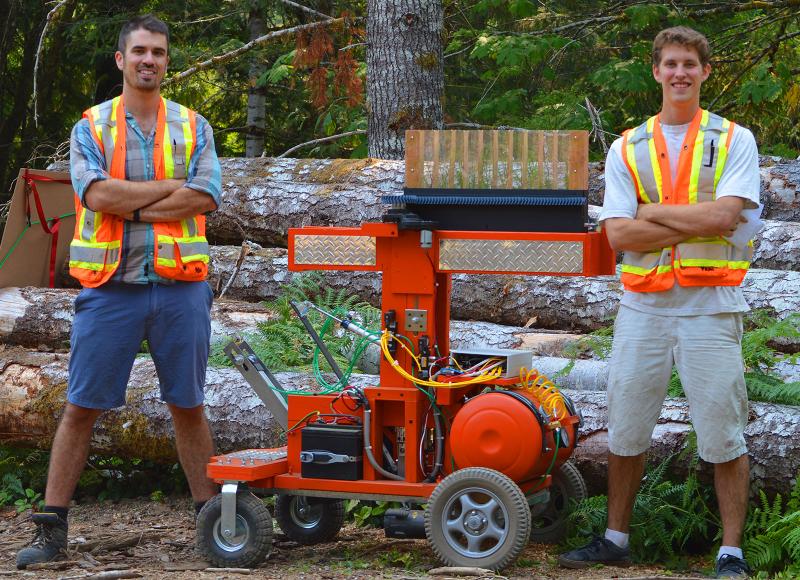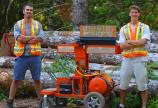Engineering co-op students build tree-planting robot to help fight deforestation
- Vanessa Stofer

Many students spend their summers tromping through slash-piles and battling blackflies to replant Canada’s forests. Two UVic engineering undergrads took a different approach: they designed and built a tree-planting robot with the idea of supplementing the humans’ hard work.
“TreeRover” is the brainchild of third-year electrical engineering students Nick Birch and Tyler Rhodes. Through an entrepreneurial co-op work term, they formed their own company—Iota Enterprises—to build their robot prototype in Rhodes’ Saanich backyard.
Growing up on Vancouver Island, Birch and Rhodes have always enjoyed outdoor pursuits and electronics projects. “A tree-planting robot seemed like a logical way to combine those interests to create something that could positively impact the environment,” says Birch, “especially given the extent of BC’s forest fires this past summer.”
The bright orange TreeRover prototype, which carries up to 10 seedlings, has a four-wheeled electric-drive base with an air-powered planting mechanism mounted on top. The robot drives to a planting site, punches a hole in the ground with a hollow metal tube and deposits a tree seedling with a whoosh of pressured air. It then tamps the earth around the seedling with a metal “foot”—mimicking a planter’s heavy boot—to ensure it’s secure.
“The TreeRover has been challenging and fun to build,” says Birch. “Tyler and I learned a lot of practical skills over this work term. Because our team only consists of two people, we were forced to be very hands-on in all aspects of the project.”
UVic students in any program can choose the entrepreneurial co-op option, which allows students to either work for clients (on a self-employed or contract basis) or develop a product or service over a four-month period with input from a mentor and support from a co-op coordinator. For Birch and Rhodes, this work term was their third.
“We chose to do an entrepreneurial work term this time for the unique learning opportunities it presented—business, marketing and design experience,” says Birch. “We’d definitely encourage others to try the entrepreneurial option because it’s a low-risk way to try a business idea and gain skills crucial to creating a successful startup.”
While Birch and Rhodes have now returned to their full-time engineering studies, they’re raising funds to upgrade their TreeRover prototype’s planting mechanism, navigation system and powertrain and to allow it to carry more seedlings. Going forward, they’re hoping to continue using their education to develop more sustainable technologies—something they’ve both realized they have a passion for.
“The co-op program has allowed both of us to explore different career options and gain experience in a variety of industries,” says Birch. “It’s a great way to find out what you love to do.”

